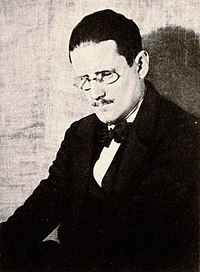
James Joyce - Sep 1922 Shadowland.
(Image by Wikipedia (commons.wikimedia.org), Author: Man Ray) Details Source DMCA
Duluth, Minnesota (OpEdNews) April 8, 2022: Disclosure: My interest in the Irish literary artist James Joyce (1882-1941) is secondary to my interest in the Canadian Renaissance specialist and media ecology theorist and Catholic convert (in the spring of 1937) Marshall McLuhan (1911-1980; Ph.D. in English, Cambridge University, 1943). However, for Marshall McLuhan, James Joyce was his Virgil -- and, figuratively speaking, Roman Catholic tradition was his Beatrice, as, in effect, the young American Catholic journalist Nick Ripatrazone nicely notes in his new 2022 book Digital Communion: Marshall McLuhan's Spiritual Vision for a Virtual Age (Minneapolis: Fortress Press).
Given my own personal hierarchy of values regarding James Joyce and the self-described Thomist Marshall McLuhan, I readily recognize that the Irish philosopher Fran O'Rourke writes with admirable lucidity and relevant historical contextualization in his new 2022 book Joyce, Aristotle, and Aquinas (University Presses of Florida). In this massively learned and massively researched book, the author ably discusses the sweep of Western philosophy from Heraclitus and Parmenides and Plato and Aristotle onward well beyond St. Thomas Aquinas up to James Joyce's day.
Incidentally, Fran O'Rourke even refers in passing to the Victorian Jesuit Scotist poet and classicist Gerard Manley Hopkins' poem "That Nature Is a Heraclitean Fire" (p. 106). Hopkins (1844-1889) lived in Ireland for a number of years and died in Dublin. Hopkins, who was himself educated at Oxford University, also wrote a poem titled "Duns Scotus's Oxford." Fran O'Rourke also discusses John Duns Scotus (p. 196).
For further discussion of Hopkins and related matters, see the American Jesuit Walter J. Ong's book Hopkins, the Self, and God (University of Toronto Press, 1986), the published version of Ong's 1981 Alexander Lectures at the University of Toronto.
Now, Fran O'Rourke says, "In broad terms, the central theme of my inquiry is the meaning of identity as it surfaces in recurrent iterations throughout Joyce's writings. The question of identity is ultimately a philosophical question; the principle of identity is considered the first law of reality" (p. 2).
Fran O'Rourke also says, "Joyce declared that the most beautiful, all-embracing, theme was that of the Odyssey, and the subject of Odysseus the most human in world literature. Odysseus's character comprises myriad aspects, revealed through a multiplicity of actions; Homer's success was to shape this diversity into a coherent unity and identity" (p. 3).
Now, in 2022, we are commemorating the centenary of the publication of James Joyce's experimental novel Ulysses in 1922. In it, young Stephen Dedalus engages in philosophical thought and debate, so Fran O'Rourke's new 2022 book Joyce, Aristotle, and Aquinas is most timely for first-time readers of James Joyce's Ulysses. Fran O'Rourke's book is accessible to first-time readers of Ulysses as well as to Joyce specialists.
Because the eighteen episodes in Ulysses are somehow supposed keyed to the Homeric epic the Odyssey, we should not be surprised that Fran O'Rourke accentuates the ancient Greek philosophy, including not only Aristotle, but also Plato and Parmenides and Heraclitus (for specific pages references to Plato, Parmenides, and Heraclitus, see the "Index Nominum" [pp. 309-314]). Because Fran O'Rourke routinely refers to the names of the eighteen episodes in Ulysses, I hope that a second edition of his book includes an "Index of Episodes in Ulysses."
Now, Fran O'Rourke says, "The ancient rhapsode introduced Odysseus to his audience as 'a man of many turns': polutropos, literally 'of many tropes'" (p. 2). In James Joyce's Ulysses, the Wandering Jew Leopold Bloom represents the modern Odysseus in Dublin, and so James Joyce represents the modern equivalent of the ancient Greek rhapsode, except that he is engaged in writing oh so carefully for printed publication, not in singing the tale of Odysseus.
See Albert B. Lord's classic book The Singer of Tales (Harvard University Press, 1960).
But also see Eric A. Havelock's classic book Preface to Plato (Belknap Press of Harvard University Press, 1963) and John Miles Foley's judicious book Homer's Traditional Art (Pennsylvania State University Press, 1999).
Subsequently, Fran O'Rourke says, "In his action and adventure, Odysseus was polytropic, but he had a single focus in mind: to return to Ithaca. In Aristotelian terms, his voyage was pros hen [in transliterated Greek], it had a solitary goal. Joyce's language is polytropic, but just as 'being is said in many way' [by Aristotle, whose Greek is here translated], there is a commanding unity. Analogy provides the controlling and ordering principle" (pp. 154-155). Fran O'Rourke devotes an entire chapter to discussing analogy (pp. 132-163).
In a nutshell, in Western philosophy from Plato and Aristotle onward for centuries, philosophical discourse requires operationally defined and explained terminology used in a univocal way, not in an equivocal way. Put differently, would-be philosophers could not be polytropic, but were obliged to use their key terminology in a univocal way.
However, according to the Irish philosopher Fran O'Rourke, "James Joyce's language is polytropic" (p. 154), which means that we should not read him as though he were a philosopher, even though the semi-autobiographical character Stephen Dedalus engages in philosophical ruminations.
(Note: You can view every article as one long page if you sign up as an Advocate Member, or higher).




